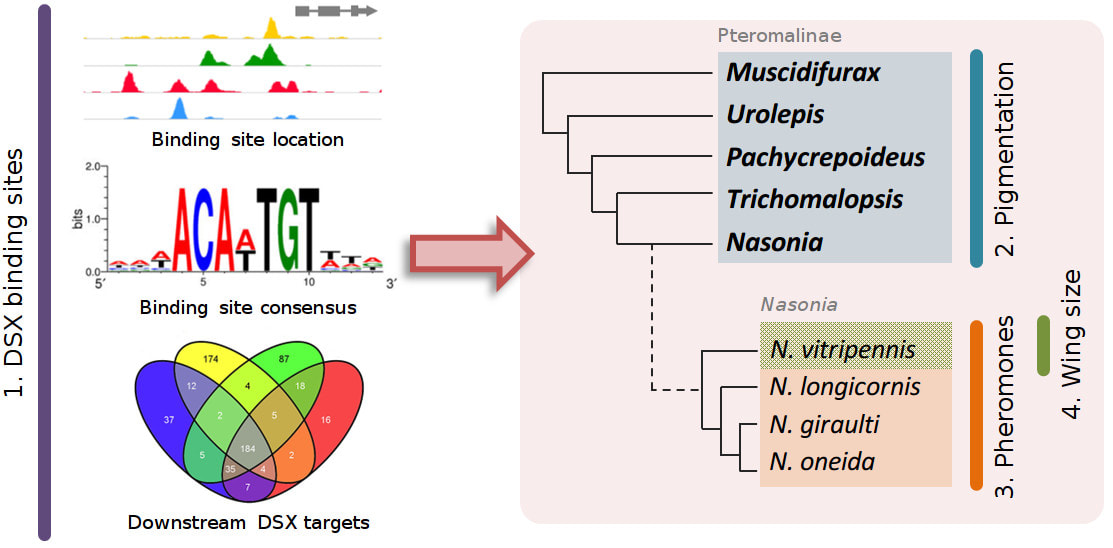Archive
CLOSED: Postdoc - Gene regulatory evolution in insect sexual dimorphism
Within my lab I'm looking for a highly motivated and skilled postdoc candidate, interested in curiosity-driven research who can work in a multidisciplinary team in a collaborative spirit. Your main task will be to identify the binding sites and target genes of the sexual differentiator, doublesex.
For more background on the position, you can find the full proposal here.
To apply for this position please go here. The deadline is September 23.
I'm looking for a candidate that has:
Within the NWO-Vidi project, you will identify regulatory elements and target genes involved in sexual differentiation in the parasitoid wasp, Nasonia vitripennis, by combining a genome-wide transcription factor binding site survey with transcriptome-wide expression analysis (see the below picture for an overview of the entire project, you will focus on part one). For this you will use DNA affinity purification sequencing (DAP-seq). It works with an affinity-purified transcription factor followed by next-generation sequencing of the binding site enriched genomic DNA library. This was recently successfully used to identify the Arabidopsis cistrome. You will then identify and locate the DSX binding sites to also reveal the, mostly unknown, DSX downstream target genes. You will verify the results from the DAP-seq assay by knocking down dsx using RNA interference (RNAi) by microinjecting in the larval stage followed by transcriptome-wide RNA sequencing (RNA-seq). You will then analyze this data for differentially expressed DSX target genes. Together with the rest of the team you will explore the molecular mechanisms underlying speciation, which can eventually lead to in the development of new synthetic genetics-based tools for biological control of pest insects by parasitoid wasps.
You will be based in the Laboratory of Entomology in Wageningen, a stimulating research environment where you will work in close collaboration with the team on insect sexual dimorphism consisting of staff, PhD and MSc students. You will have the opportunity to expand your scientific horizon through meetings, conferences and training. The postdoc position is 0.8 fte (based on a 1.0fte of 38h/week) for 12 months, which can be extended with 30 months (0.8fte) after a positive evaluation. The maximum gross salary is € 4.166 per month (based on 1.0 fte employment).
For more background on the position, you can find the full proposal here.
To apply for this position please go here. The deadline is September 23.
I'm looking for a candidate that has:
- An excellent academic record (PhD) in molecular (insect) sciences, particularly in molecular biology.
- Expertise with protein analysis; next generation sequencing; differential gene expression (DE-RNAseq) analysis or bioinformatics in general.
- Strong affinity with insects and molecular work including micro-injections.
- Excellent oral and written English communication skills.
- Motivation to (co)-supervise PhD and BSc/MSc students, and disseminate results through publication of scientific papers, conferences and project meetings.
Within the NWO-Vidi project, you will identify regulatory elements and target genes involved in sexual differentiation in the parasitoid wasp, Nasonia vitripennis, by combining a genome-wide transcription factor binding site survey with transcriptome-wide expression analysis (see the below picture for an overview of the entire project, you will focus on part one). For this you will use DNA affinity purification sequencing (DAP-seq). It works with an affinity-purified transcription factor followed by next-generation sequencing of the binding site enriched genomic DNA library. This was recently successfully used to identify the Arabidopsis cistrome. You will then identify and locate the DSX binding sites to also reveal the, mostly unknown, DSX downstream target genes. You will verify the results from the DAP-seq assay by knocking down dsx using RNA interference (RNAi) by microinjecting in the larval stage followed by transcriptome-wide RNA sequencing (RNA-seq). You will then analyze this data for differentially expressed DSX target genes. Together with the rest of the team you will explore the molecular mechanisms underlying speciation, which can eventually lead to in the development of new synthetic genetics-based tools for biological control of pest insects by parasitoid wasps.
You will be based in the Laboratory of Entomology in Wageningen, a stimulating research environment where you will work in close collaboration with the team on insect sexual dimorphism consisting of staff, PhD and MSc students. You will have the opportunity to expand your scientific horizon through meetings, conferences and training. The postdoc position is 0.8 fte (based on a 1.0fte of 38h/week) for 12 months, which can be extended with 30 months (0.8fte) after a positive evaluation. The maximum gross salary is € 4.166 per month (based on 1.0 fte employment).







